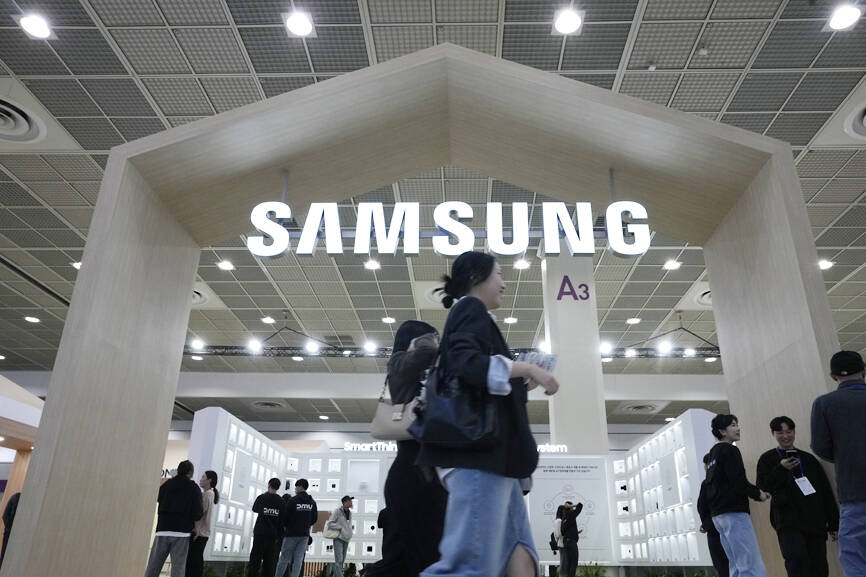Samsung Electronics Co plans to buy back about 10 trillion won (US$7.2 billion) of its own stock over the next year, putting in motion one of the larger shareholder return programs in its history.
South Korea’s biggest company would repurchase the stock in stages over the coming 12 months, it said in a regulatory filing on Friday.
As a first step, it would buy back about 3 trillion won of paper starting today up until February next year, all of which it would cancel. The board would deliberate on how best to effect the remaining 7 trillion won of buybacks.

Photo: AP
The move coincides with investors’ growing concerns about the firm’s memory chip business, which is struggling to keep pace with SK Hynix Inc.
Samsung’s smaller rival has become the dominant supplier of high-bandwidth memory (HBM) to Nvidia Corp, which uses the cutting-edge chips in its popular artificial intelligence (AI) accelerators.
That has sparked fears that Samsung — long the dominant force in global memory semiconductors — is missing out on the AI boom.
Investors are also trying to gauge its vulnerability to US president-elect Donald Trump’s protectionist trade policy, given its exposure to China.
Samsung’s shares rose 8.6 percent on Friday before the buyback announcement, though it remains down 32 percent on the year.
The world’s largest maker of smartphones is also grappling with a consumer electronics slump globally.
Its stock is trading at a discount of more than 10 percent to the consensus estimate for its one-year forward accounting book value, according to data compiled by Bloomberg.
Last month, Samsung declared progress in qualifying and supplying its most advanced AI memory chips to Nvidia.
The company now expects to start selling its most advanced HBM3E memory chips in the fourth quarter, Jaejune Kim, executive vice president of Samsung’s memory business, said on an earnings call at the time.
Still, some investors remain cautious about the outlook.
“A lower valuation is justified given trade risks around Korea and also the catch-up in HBM, which will take time, and a weak memory environment,” said Sat Duhra, a fund manager at Janus Henderson Group.
“There are better tech stocks to own here — most of them are in Taiwan,” he said.

NEW IDENTITY: Known for its software, India has expanded into hardware, with its semiconductor industry growing from US$38bn in 2023 to US$45bn to US$50bn India on Saturday inaugurated its first semiconductor assembly and test facility, a milestone in the government’s push to reduce dependence on foreign chipmakers and stake a claim in a sector dominated by China. Indian Prime Minister Narendra Modi opened US firm Micron Technology Inc’s semiconductor assembly, test and packaging unit in his home state of Gujarat, hailing the “dawn of a new era” for India’s technology ambitions. “When young Indians look back in the future, they will see this decade as the turning point in our tech future,” Modi told the event, which was broadcast on his YouTube channel. The plant would convert

‘SEISMIC SHIFT’: The researcher forecast there would be about 1.1 billion mobile shipments this year, down from 1.26 billion the prior year and erasing years of gains The global smartphone market is expected to contract 12.9 percent this year due to the unprecedented memorychip shortage, marking “a crisis like no other,” researcher International Data Corp (IDC) said. The new forecast, a dramatic revision down from earlier estimates, gives the latest accounting of the ongoing memory crunch that is affecting every corner of the electronics industry. The demand for advanced memory to power artificial intelligence (AI) tasks has drained global supply until well into next year and jeopardizes the business model of many smartphone makers. IDC forecast about 1.1 billion mobile shipments this year, down from 1.26 billion the prior

People stand in a Pokemon store in Tokyo on Thursday. One of the world highest-grossing franchises is celebrated its 30th anniversary yesterday.

Zimbabwe’s ban on raw lithium exports is forcing Chinese miners to rethink their strategy, speeding up plans to process the metal locally instead of shipping it to China’s vast rechargeable battery industry. The country is Africa’s largest lithium producer and has one of the world’s largest reserves, according to the US Geological Survey (USGS). Zimbabwe already banned the export of lithium ore in 2022 and last year announced it would halt exports of lithium concentrates from January next year. However, on Wednesday it imposed the ban with immediate effect, leaving unclear what the lithium mining sector would do in the